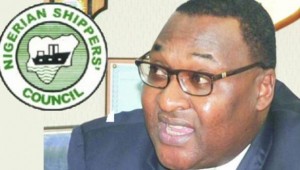
The Nigerian Shippers’ Council (NSC) became the economic regulator of the port after the pronouncement by the erstwhile Minister of Transport, Mallam Idris Umar in February, 2014.
Within six months after the new mandate was given to the agency, the management embarked on tours of the port operators and stakeholders to sensitise them about their mandate.

The NSC hit the ground running six months later after the sensitisation tours and their first assignment was the reduction of the terminal charges by the terminal operators and the shipping lines agency charges.
It was their first deal because of the bite such charges are having on the people and the Nigerian market. This is so because the charges on cargoes coming into the country will always have a direct impact on the price of goods in the market.

Though the matter has become an issue of litigation, the court is left to give its verdict as it deems fit.
Meanwhile, there have been mixed feelings on how well the agency has performed the roles it is saddled with.
To actually ascertain how well they have faired in this role, MMS Plus Weekly took on some stakeholders in the maritime sector to find out how far they feel the agency has succeeded in carrying out the economic regulatory role it is endowed with.
Barrister Emmanuel Osuala Nwagbara is a maritime lawyer and the Secretary, Nigerian Maritime Exposition, 2015; he has this to say about the regulatory role of the Nigerian Shippers’ Council.
“After the Nigerian Shippers’ Council was appointed the economic regulator in the port system, I think they have done very well. The appointment was around February 2014 and we started noticing their clout as economic regulator about six months after clearly after they might have scanned the environment and decided to begin from somewhere and the first axe was wielded against the terminal operators and the shipping companies when they unilaterally increased the progressive charges on containerised cargoes and the shipping lines agency charges.
“The Shippers’ Council did well in exercise of its powers as economic regulator in the port system to order them to revert to a particular charge level which the operators turned down and proceeded to court and the Council did not shy away from putting on the gauntlet to fight back and we all know the result today.
“That is an indication that they are living up to their billings. We have also seen them come out recently smoking when APMT suffered system failure and were not prepared to waive demmurage and issue credit note on the demmurage charged as a result of the failure caused by APMT .
“The appointment will not do a magic wand, the appointment has been made and powers given under that assignment are being exercised and it surely will take sometime before we begin to notice the true effect or impact of the power exercised by the Nigerian Shippers’ Council.
“do not forget that in every industry where you see regulatory framework as we are seeing in the shipping sector, the first thing you notice is a culture shock in the sense that a particular operator has been doing a particular thing in a particular way and is satisfied and there has not been any challenge or instruction to reverse and all of a sudden, the operator receives an instruction to do things in a different way, so that shock will come and the tendency will be to resist that shock in the first instance.
“So, you don’t expect that the effect will be noticed overnight but now the operators know that when they take wrong decisions in the community, Nigerian Shippers’ Council will call them back to order.”
 MMS PLUS NG – Maritime, Aviation, Business, Oil and Gas News Online Newspaper with coverage in Maritime, Oil and Gas, Aviation, Power and Energy as well as Financial News
MMS PLUS NG – Maritime, Aviation, Business, Oil and Gas News Online Newspaper with coverage in Maritime, Oil and Gas, Aviation, Power and Energy as well as Financial News









